With researchers from a broad range of academic disciplines, ISR serves as a national laboratory for the social sciences, advancing public understanding of human behavior through empirical research of extraordinary depth and breadth.
Among our accomplishments:
- ISR founding director Rensis Likert developed the elegant “Likert Scale,” the most widely used measure of attitudes and opinions in academic, government, and private sector research today.
- ISR pioneered survey sampling theories and methods that resulted in the only correct prediction of the 1948 U.S. presidential election and that still form the basis of scientifically valid surveys, market research, and public opinion polling.
- ISR fielded the 1954 double-blind experimental trials for the Salk polio vaccine on a national sample of U.S. schoolchildren, revealing that the vaccine was both safe and effective, and ending the polio epidemic that terrorized a generation.
- ISR started the field of organizational behavior, developing T-groups and sensitivity training.
- ISR discovered the high turnover in the poverty population, countering widespread misconceptions that the same people remain mired in a culture of poverty year after year.
- ISR established that behavior is at least as important as biology in determining health and longevity.
More information
To learn more about ISR’s history, download a PDF of “Social Science in the Public Interest: A Fiftieth-Year History of the Institute for Social Research,” published in 1998.



Timeline
Birth of the Survey Research Center
Rensis Likert and Angus Campbell came to the University of Michigan and assembled colleagues who had worked at the U.S. Department of Agriculture's Division of Program Surveys (DPS) during World War II to start the Survey Research Center (SRC). The newcomers—George Katona, Charles Cannell, Leslie Kish, and Daniel Katz—arrived by 1947.
Surveys of Consumers
The Surveys of Consumers, under George Katona, were created to examine consumer attitudes and expectations about the U.S. economy. Over time, the surveys grew to include items such as respondents' assessment of business conditions, expected changes in inflation, unemployment and interest rates, economic policies, and market conditions for household durable goods. By providing a gauge of consumer reactions to changes in the economic environment, the surveys helped shape public policies and business decisions, and the monthly survey's Index of Consumer Expectations is an official component of the U.S. Index of Leading Economic Indicators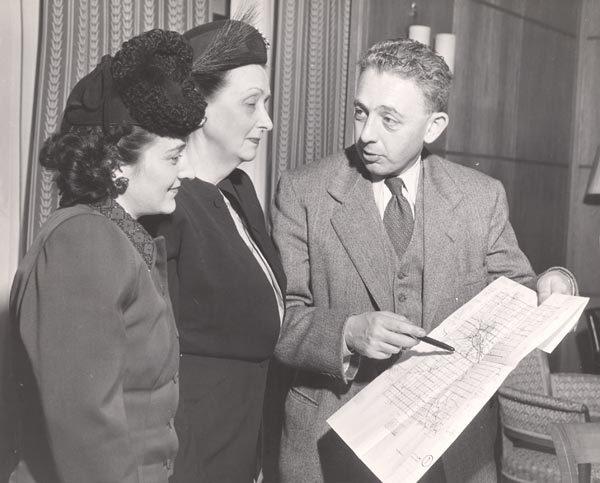
Organizational Behavior Program
Rensis Likert and Daniel Katz started this program, originally known as the Human Relations Program, in order to better understand what characteristics of leadership and structure would make organizations more effective. A companion effort, the Social Behavior and Health Program, concentrated on the effects of organizational characteristics on individual outcomes including well-being, quality of life, and health. Early researchers included Katz, Floyd Mann, Robert Kahn, Nancy Morse Samelson, Gerald Gurin, Donald Pelz, Arnold Tannenbaum, and Stanley Seashore.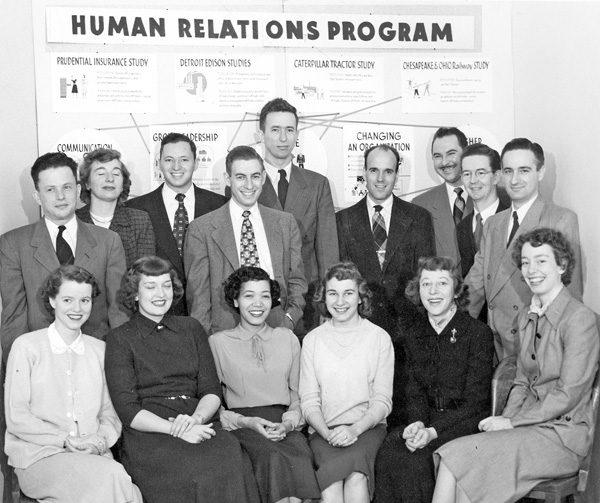
The Research Center for Group Dynamics
Dorwin "Doc" Cartwright—another member of Likert's DPS group—Ronald Lippitt, Leon Festinger, John R. P. French, Jr., and Alvin Zander were the next major infusion of talent as they came to Michigan. The group of experimental psychologists, known as the Research Center for Group Dynamics, had worked with Kurt Lewin at the Massachusetts Institute of Technology until his death in 1947.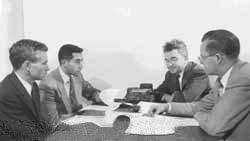
The Summer Institute in Survey Research Techniques
SRC created the Summer Institute to provide quality graduate training in all aspects of survey research to individuals in areas including business, public health, natural resources, law, medicine, and social work. During the institute's 62 years, more than 10,000 students from more than 105 countries have taken the graduate-level courses teaching the design, implementation, and analysis of surveys. (Photo not from 1948 class.)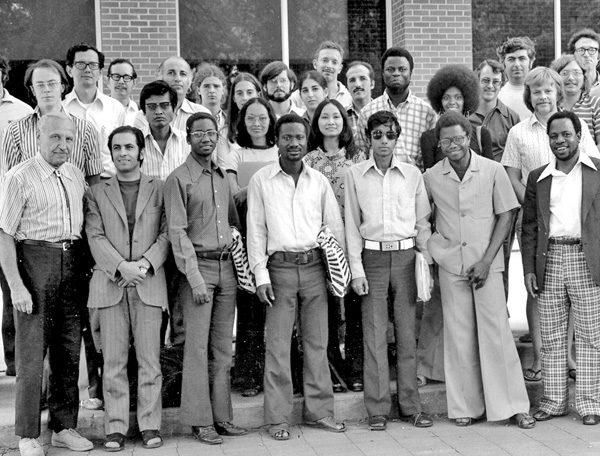
Michigan Election Studies
Angus Campbell and Robert Kahn oversaw a national pilot study of opinions about foreign affairs that, based on two questions, revealed that the presidential race between Harry Truman and Thomas Dewey—predicted to be a Dewey landslide—was actually too close to call. The insights gleaned from that first study convinced social scientists of the need to do more voting behavior research. In 1952, Campbell and Warren Miller developed the study into a two-part time series survey, known as the Michigan Election Studies; the series covered every presidential and midterm election between 1956 and 1976. In 1977, with major funding from the National Science Foundation, the Michigan Election Studies became the National Election Studies and continued the unbroken series of election surveys with greater participation by the national research community. In 2005, the studies were renamed the American National Election Studies, managed by a multi-university collaboration headed by ISR and Stanford University.
Photo: At St. Louis Union Station, postmaster Bernard Dickmann (left) stands next to newly elected President Harry S. Truman as Mr. Truman holds up the famous Chicago Tribune newspaper headline "Dewey Defeats Truman." November 5, 1948. Photo credit: campaign scrapbook of Harry S. Truman, trumanlibrary.org
Establishment of ISR
The Survey Research Center and the Research Center for Group Dynamics joined on Feb. 1 to form the Institute for Social Research, launching the nation's leading academic laboratory for social science research. The new enterprise, said University of Michigan President Alexander Ruthven, would more effectively "bring to bear quantitative and experimental research methods on complex and important social problems."
Rensis Likert, 1st ISR Director
Likert, co-founder and head of SRC, became the first director of ISR. An organizational psychologist and developer of the Likert Scale—a scale widely used in survey research— Likert also developed a system for identifying organizational styles, ranging from System 1—Exploitive Authoritative—to System 4—Participative Group. Likert was known for his support of interdisciplinary collaborations and emphasis on using social science research to effect positive change.
The Founding Group
By the end of the decade, ISR's founding group was in place, including up-and-coming social scientists John Lansing, Robert Kahn, James Morgan, Elizabeth Douvan, and Stephen Withey.
The Detroit Area Study
Conceived of by Angus Campbell and Ronald Freedman, and run by ISR and Michigan's Sociology Department, the Detroit Area Study provided an unusual opportunity to do basic social science research, train graduate students, and produce social science data of use to the Detroit community. Under the guidance of faculty investigators, students in the three-semester course conceptualized a problem, designed and pre-tested survey questions, drew samples, and conducted door-to-door interviews in the Detroit area, then coded and analyzed the data. The course was discontinued in 2002 after more than 50 years, but the training laboratory lives on through its former students around the world.
Research Methods in the Behavioral Sciences
This pivotal volume of essays edited by ISR's Leon Festinger and Daniel Katz helped establish ISR's reputation as an organization that would both codify and advance excellence in methodological practices.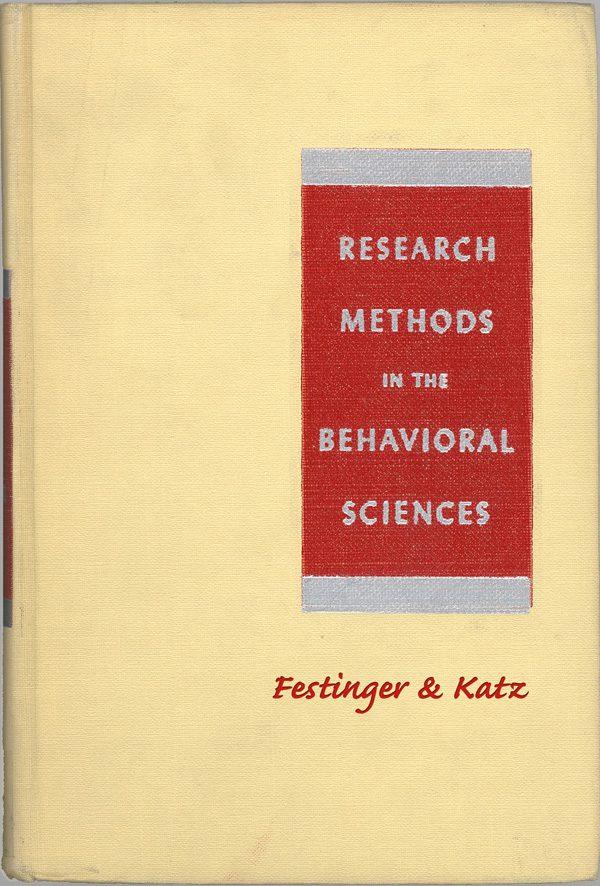
Growth of American Families Survey
Under the direction of Ronald Freedman, SRC conducted the first major surveys of fertility and family planning in the United States. The Growth of American Families Survey paved the way for the National Fertility Survey, and later the National Survey of Family Growth.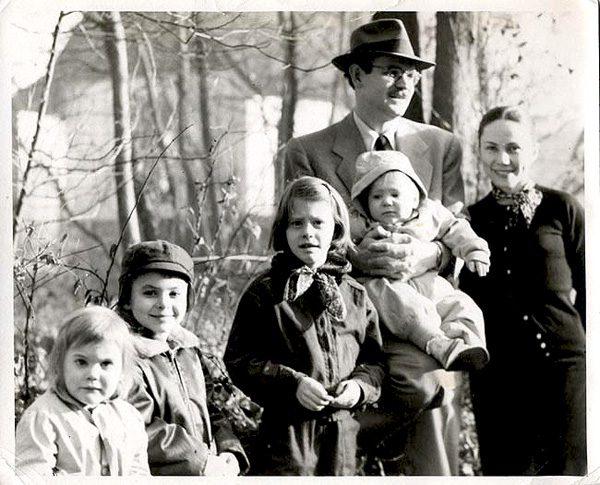
The Dynamics of Interviewing
Charles Cannell and Robert Kahn wrote this classic book on methodological principles that enhanced ISR's already strong reputation in survey methodology.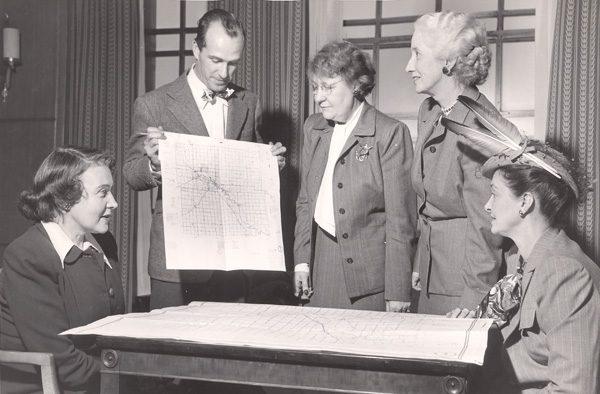
Life Course Development Program
Elizabeth Douvan, Joseph Veroff, and Gerald Gurin founded this program, originally known as the Family and Sex Roles Program, to research shifts in mental health, values, attitudes, and behavior over the life course. The researchers conducted two groundbreaking mental health surveys—in 1957 and then again in 1976—which led to influential books by Veroff, Douvan, and Richard Kulka: The Inner American and Mental Health in America.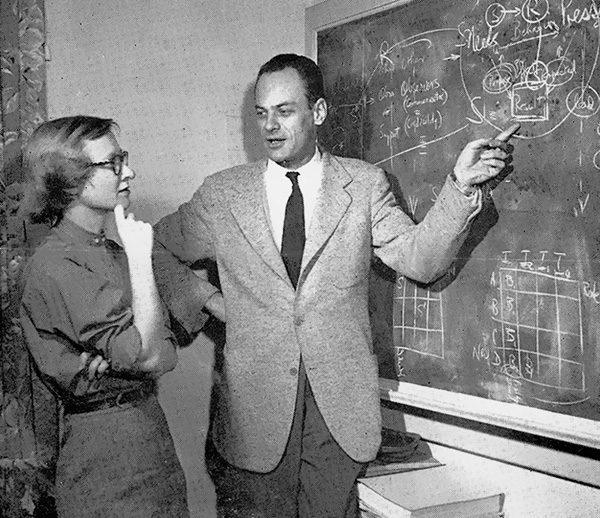
The American Voter
This influential book by Angus Campbell, Philip Converse, Warren Miller, and Donald Stokes, using data from the 1952 and 1956 Michigan Election Studies, had an immediate impact on thinking about voter behavior. Many of the book's central claims—such as the importance of the key concept of party identification, the identification of a broad range of factors that influence voter behavior, and the conclusion that the average voter was surprisingly unsophisticated—still guide thinking about voter behavior today.
Watch video of Phil Converse talking about voter behavior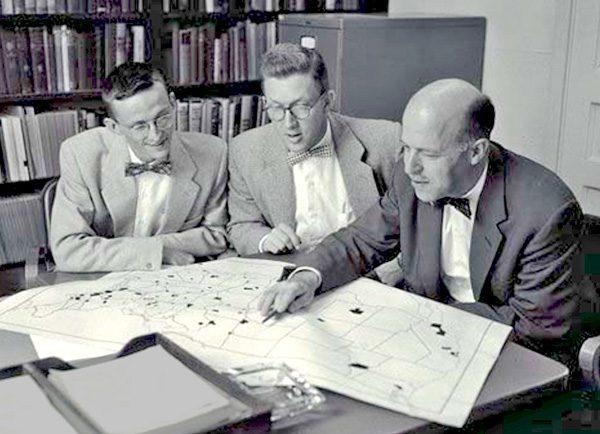
Sampling Program for Foreign Statisticians
In an early move to deepen ISR's engagement with the international community, Leslie Kish founded an intensive eight-week summer program to offer graduate coursework to survey statisticians from developing nations. During its 48-year history, the program has trained more than 500 samplers from some 105 countries.
Population Studies Center
Ronald Freedman founded the center, with the support of the Ford Foundation, as a unit within the Department of Sociology. Freedman, the first director, aimed to create a place where demographers could work together and train students in population studies. In 1966, PSC formed close ties with the Department of Economics, solidifying a growing focus on socioeconomic research.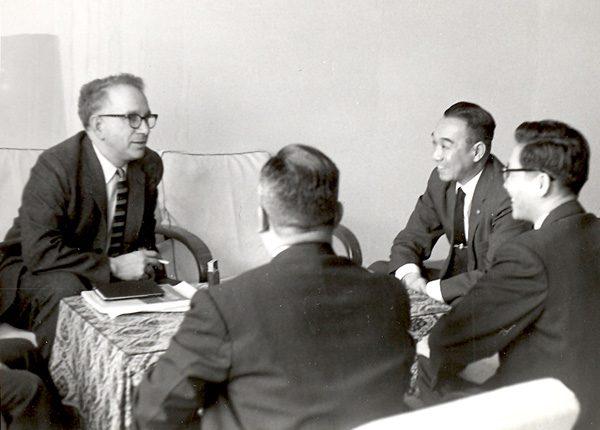
The Inter-university Consortium for Political and Social Research
Established by Warren Miller, who served as its first director, ICPSR (initially ICPR) was created to collect, curate, preserve, and disseminate social science data and to provide training through the Summer Program in Quantitative Methods of Social Research. Originally housed within the Political Behavior Program of the Survey Research Center and then the Center for Political Studies, ICPSR became a self-standing center in 1998. It has grown from the original 21 founding member institutions to more than 660 members with a substantial international presence, and now trains over 800 scholars each summer. Considered the world's largest archive of digital social science data—currently with more than one million research data files—ICPSR is a leader in data access and stewardship issues for the community.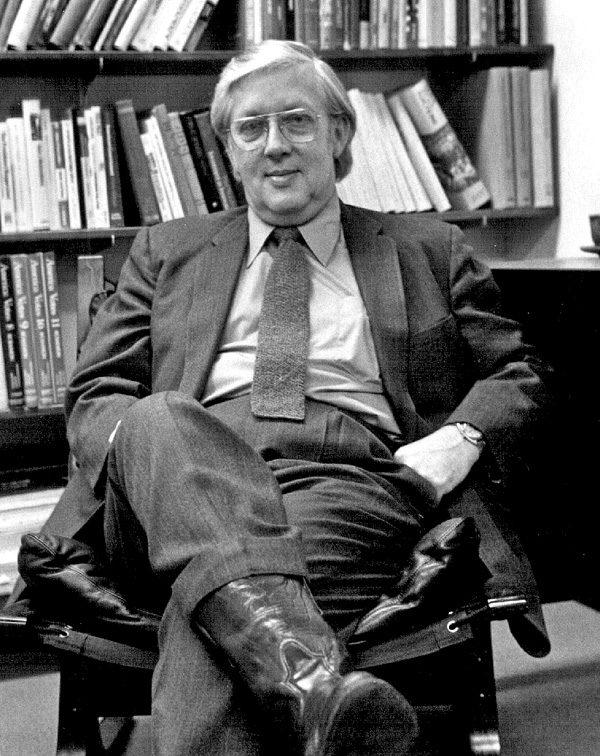
Taichung Experiment
Ronald Freedman and Barney Berelson of the Population Council undertook this landmark survey in Taichung, Taiwan, to study the diffusion and acceptance of family planning among women there. The project demonstrated that poor women in developing countries were interested in limiting the size of their families and that surveys could be used to assess their attitudes and behaviors. The study initiated PSC's long involvement with family planning and fertility research in Taiwan and other developing nations, and set the stage for the center's focus on international demographic research and training.
The Center for Research on the Utilization of Scientific Knowledge
An advisory committee headed by Ronald Lippitt established the center to address the failure of organizations and individuals to make use of scientific knowledge. CRUSK's goals were to examine how individuals and groups spread and use new knowledge, to analyze approaches to encourage knowledge utilization, and to consider the broader moral issues involved. Floyd Mann served as the first director. The center was disbanded in 1985 due to financial and staffing problems.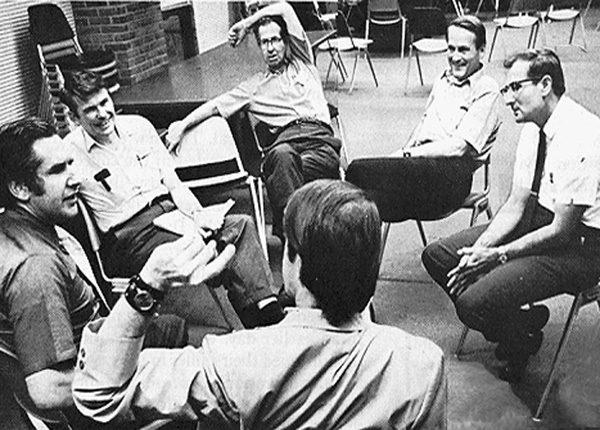
Thompson Street Building
After occupying four locations in less than 20 years, ISR moved into its own building, which included a set of laboratories for conducting experiments on groups, the first such labs on the Michigan campus. Large wings were added to the original building in 1976 and 1989 as the institute continued to grow, and a geometric sculpture, Convergence, was set in front in 1990. By 1998, the institute had outgrown the building again, forcing certain operations into rental space.
Survey Sampling
Leslie Kish's overview of sampling techniques, including many of the technical procedures and methodological innovations that made surveys, censuses, and political polls more accurate, was widely considered the "bible" of the field.
The Social Psychology of Organizations
Robert Kahn's and Daniel Katz's pioneering book influenced the field of organizational research by applying a framework of open system theory—the assumption that an organization continuously interacts with its environment—to research on leadership, role behavior, and organizational effectiveness.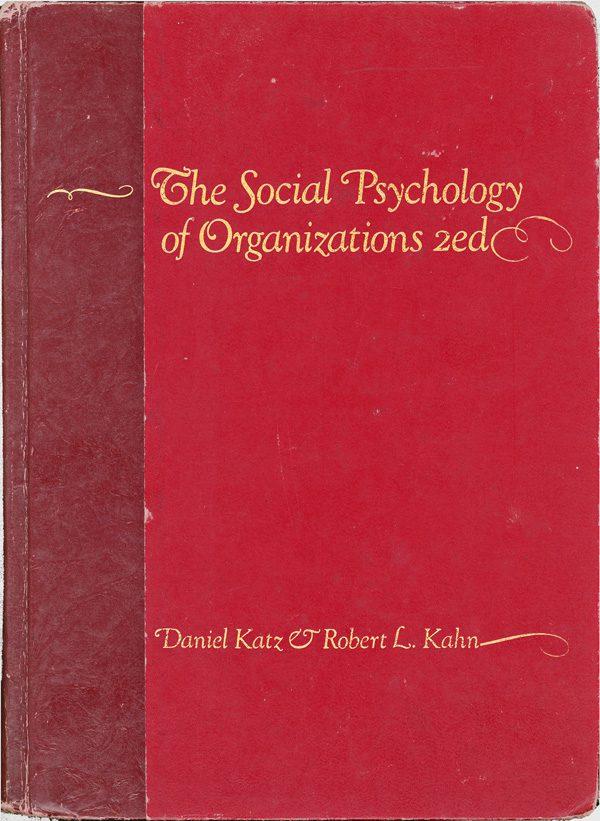
Computing Evolution and Osiris Software
ISR installed an IBM 360/40 mainframe computer, dramatically improving the institute's computing capabilities. Soon after, the Computer Services Facility designed a new system of general and special-purpose software, OSIRIS, to run on the 360/40. The software, used for data management, statistical analysis, and display, was quickly adopted by ISR researchers, and later versions became a mainstay of the international research community. OSIRIS remained the standard software for ISR until 1991.
The Mere Exposure Effect
Bob Zajonc published his famous set of experimental studies in the Journal of Personality and Social Psychology showing that people tend to prefer things merely because they have been exposed to them, even if they are unaware of that exposure.
The Panel Study of Income Dynamics
James Morgan launched this early ISR panel study, intended to track the same individuals over time. The study now has followed American families for more than 40 years, looking at employment, retirement, income, expenditures, wealth, pensions, health, insurance, marriage and childbearing, mental health, and philanthropy. Having started with 5,000 families, ISR by 2008 was interviewing some 8,000 families, consisting of more than 65,000 members across four generations. Among its accomplishments, the study has led to key inter-generational analyses and a more nuanced understanding of the dynamics of poverty.
Watch video: America's changing families
Angus Campbell, 2nd ISR Director
SRC and ISR co-founder Campbell, an experimental psychologist who moved into social psychology and large-scale quantitative research, was known for his research on political behavior, race relations, public affairs, and quality of life.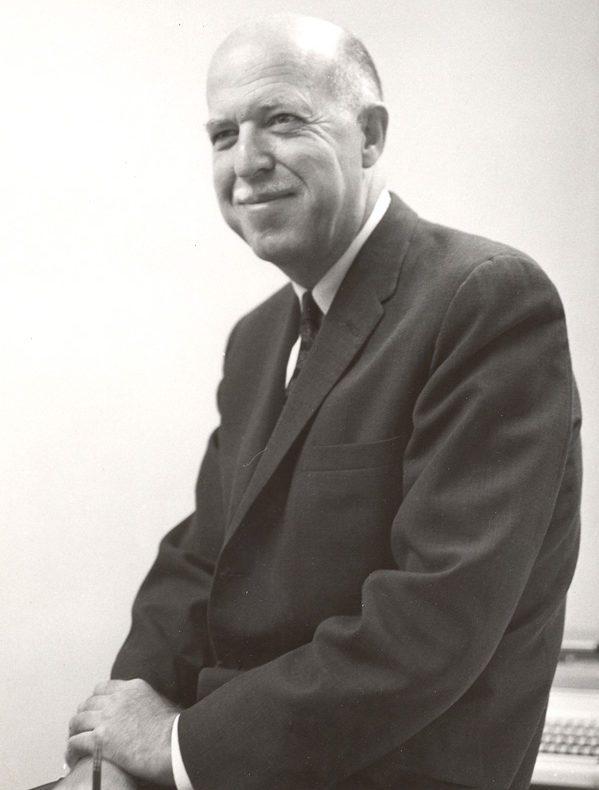
The Center for Political Studies
The success of the Michigan Election Studies, and the additional political research they generated, justified the establishment of a new center at ISR devoted to political research on issues such as individual voting behavior, media and politics, and institutional effects on policies and individual behavior. Warren Miller, for years the principal investigator of the Michigan Election Studies, was the first director. Kent Jennings, shown on the left in the photo with Phil Converse, served as Principal Investigator on the path-breaking work on the Political Socialization of Youth, 1965-1997.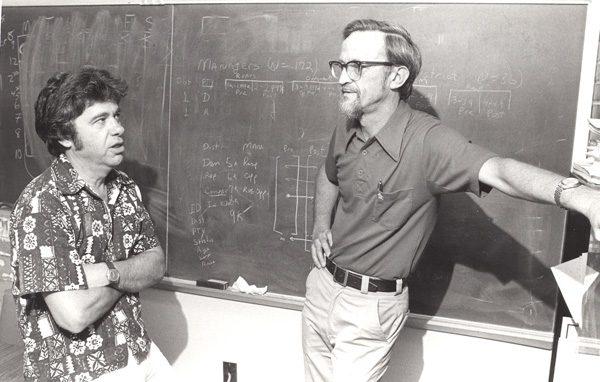
Computer-Assisted Interviewing
In order to make its phone interviewers more productive and to allow them to pose questions in more complicated sequences, ISR became one of the first academic survey organizations to use computer-assisted telephone interviewing, in which interviewers enter information directly into a computer. ISR expanded this approach in the early 1990s with computer-assisted personal interviewing, outfitting interviewers with laptops for face-to-face interviews.
Monitoring the Future
Lloyd Johnston and Jerry Bachman initiated this study to look at adolescent drug use and attitudes among American 12th graders, and in 1991 expanded it to include 8th and 10th grade students. The annual survey of some 50,000 students has provided key information about trends in drinking, smoking, and drug use; changing attitudes and values among youth; and impacts of tobacco marketing strategies, helping to guide the nation's alcohol and drug prevention strategies.
F. Thomas Juster, 3rd ISR Director
Juster, an economist, did research in areas including the analysis of what U.S. households accumulated in savings and wealth, determinants of retirement, and interrelations among health, job status, and economic status. Juster grew increasingly interested in issues affecting the country's aging population, and he later was founding principal investigator of the influential Health and Retirement Study.
Program for Research on Black Americans
James Jackson launched this program to address the need for high quality national data on African Americans, and to provide research and training opportunities for social scientists and students of color. Its first major initiative, the National Survey of Black Americans, started in 1979, assessed rates of psychological distress and serious mental problems among black Americans, along with a range of social, political and economic factors. Many participants were re-interviewed eight, nine, and 12 years after the initial study, providing longitudinal information that has helped guide policymakers and practitioners.
PRBA website
Centralized Telephone Interviewing
As telephone interviews—which were seen as more economical and efficient—began to replace face-to-face interviews as the most common survey research methodology, SRC created its first centralized telephone interviewing facility on the first floor of the Thompson building. The original facility, consisting of 18 carrels, expanded and moved within the building and then off site; became part of the Survey Research Operations; and eventually relocated to the Perry Building.
World Values Surveys
Ronald Inglehart and other ISR researchers, eager to expand on the Netherlands-based European Values Study, began a series of studies in collaboration with other countries to research political, social, and cultural values worldwide. Although the surveys began with just 22 countries, by 2008 ISR was working with social scientists from more than 60 nations.
Watch video
Research on the Census
Beginning with the 1980 United States census, Reynolds Farley examined findings from three decennial censuses, summarizing that work in four ground-breaking books that compared demographic, social, and economic characteristics of Americans in and across decades. In the two edited volumes and two monographs—The Color Line and the Quality of Life in America (with Walter Allen) and The New American Reality: Who We Are, How We Got Here, and Where We Are Going—Farley analyzed and integrated tens of thousands of national statistics in illustrating how Americans have changed.
Questions and Answers in Surveys
This influential book by Howard Schuman and Stanley Presser, of the University of Maryland, provided a comprehensive overview of survey research methodology, including chapters on Open Versus Closed Questions, The Assessment of No Opinion, The Acquiescence Quagmire, and Tone of Wording.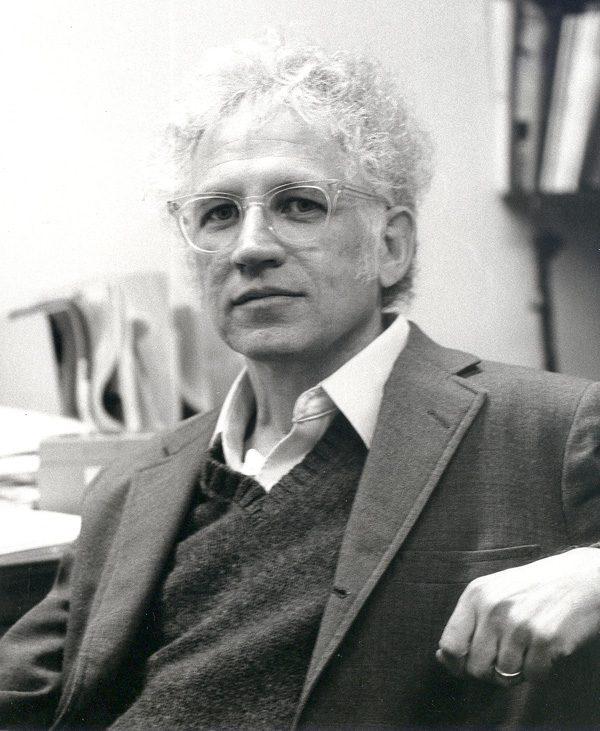
Philip E. Converse, 4th ISR Director
Converse, a social psychologist and political scientist and co-author of The American Voter, is an international authority on voting behavior and public opinion. Converse is particularly well known for his article, "The Nature of Belief Systems in Mass Publics," which argues that the voting public tends not to have a clear understanding of ideology, and does not hold consistent opinions across issues or over time.
Watch video
The Longitudinal Study of American Youth
LSAY is a three-cohort two-generation longitudinal study of national samples of public school students in the US. Originally it studied the factors related to student interest in STEM, the development of skills in those disciplines, the selection of careers, and the development of sufficient scientific literacy to perform citizenship responsibilities in a democratic society. The study was renewed in 2015 with Cohort 3.
Aging in Asia Research
Albert Hermalin received a five-year National Institute on Aging (NIA) Merit Award to study the impact of demographic and social changes in Taiwan on the welfare of the elderly. With continued NIA support through the 1990s, the work expanded to a four-country set of comparative surveys, helping to establish PSC's reputation as an authority on population aging in the developing world.
Robert B. Zajonc, 5th ISR Director
Zajonc, a social psychologist known for his work on social and cognitive processes, had been director of the Research Center for Group Dynamics. In addition to demonstrating the mere exposure effect, Zajonc's contributions included co-developing the Confluence Model, a mathematical model of the effect of birth order and family size on IQ scores.
University of Warsaw Collaboration
ISR established its first sister institute with the University of Warsaw. The success of that interaction helped encourage other diverse international collaborations with countries including Germany, South Africa, Japan, China, and Qatar.
The Joint Program in Survey Methodology
The collaboration between the universities of Maryland and Michigan and Westat, a Maryland-based survey organization, is the nation's oldest and largest graduate training program in the principles and practices of survey research. Sponsored, in part, by a consortium of US federal statistical agencies, and taught by leading faculty at ISR and Maryland, the program is targeted at producing the next generation of survey researchers, statisticians, and methodologists.


Health and Retirement Study
ISR recruited an interdisciplinary research team from across the United States to design this ambitious study to examine the health and economic circumstances of aging Americans. Commissioned and funded by the National Institute on Aging, the study of more than 22,000 participants over age 50 sheds light on issues such as precursors and consequences of retirement, life course patterns of wealth accumulation and consumption, incidence of work disability, and the relationship of health, income, and wealth over time.
David Featherman, 6th ISR Director
Featherman, a social psychologist and sociologist, was a former sociology professor at the University of Wisconsin-Madison and past president of the New York City-based Social Science Research Council. His research interests include demography, social psychology, human development, and gerontology.
Data Documentation Initiative
ICPSR Director Richard Rockwell launched this effort to establish an international standard for the content and exchange of social science documentation. In 2003 the informal working group charged with developing the specification transformed itself into the self-sustaining DDI Alliance, which now has 32 domestic and foreign member institutions. Version 3 of the XML specification, which documents the full data life cycle, was published in 2008, and has since been adopted by a significant number of social science archives and research projects worldwide.
Culture of Honor: The Psychology of Violence in the South
Richard Nisbett and University of Illinois psychologist Dov Cohen wrote this book arguing that a strong "culture of honor"—in which reputation must be protected at all cost—is responsible for higher homicide rates among whites in the American South. In a classic experiment conducted in the RCGD laboratories, investigators measured testosterone and cortisol levels in male undergraduates after they had been bumped into and sworn at in a hallway, and found higher levels and more signs of anger in students from the South.
Population Studies Center Joins ISR
Michigan's Population Studies Center, which had moved from Sociology to the College of Literature, Science, and the Arts, became a center at ISR, continuing interdisciplinary research in areas including health, disability, and mortality; population dynamics; aging; and methodology. The complex negotiations were carried out by David Lam and Arland Thornton, who also served as the first two directors, respectively, of PSC in its new home. Given the center's long history of international research and training, PSC's merger into ISR greatly expanded the institute's global activities.
Detroit Area Study: Quality of Community Life
Robert Marans was principal investigator of the 50th DAS, which built on questions posed in 1966, 1974, and 1980 to examine changes over time in the public's perceptions of various aspects of community life, including transportation, recreation, housing, and residential mobility. The survey showed satisfaction declines in many categories, but a stable 83 percent of residents surveyed in Wayne, Oakland, and Macomb counties reported satisfaction with their lives as a whole. DAS 2001 differed from previous studies in that it expanded the survey to four additional metro counties. It also linked survey responses to contextual data from the U.S. Census and other sources using geographic information systems (GIS). Marans is currently working with international researchers to adapt the survey to local conditions that allow for cross-national comparisons.
Eva Mueller Receives Economics Honor
Eva Mueller—who joined SRC as a researcher in 1951 and became a full professor in the Department of Economics in 1964—was awarded the Carolyn Shaw Bell Award from the American Economic Association's Committee on the Status of Women in the Economics Profession. The annual award honors an individual who has furthered the status of women in economics. In addition to her research, Mueller helped build the economic demography training program run jointly by PSC and the Department of Economics.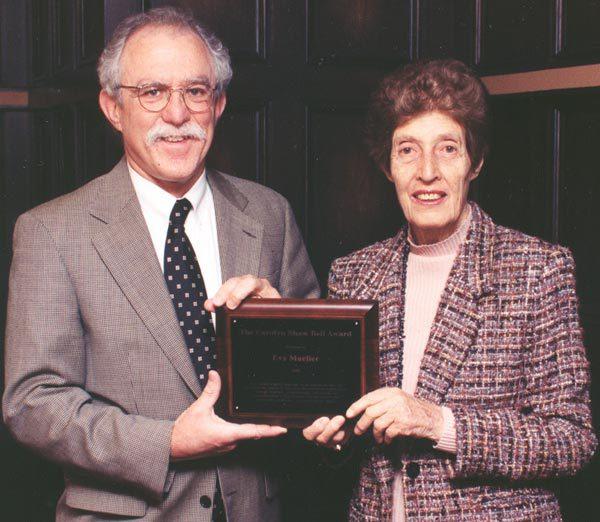
ICPSR Delivers Data over the World Wide Web
ICPSR transformed its data dissemination system to allow users around the world to download data and codebooks themselves via the Internet. Using a system called ICPSR Direct, students, faculty, and other researchers at ICPSR member and other institutions were able to find data themselves and more easily conduct social science research.
Program in Survey Methodology
MPSM starts in order to train future generations of survey methodologists who specialize in the statistical, social, and data sciences. The program offers Doctor of Philosophy and Master of Science degrees through the University of Michigan.
Perry Building
Having grown beyond the available space in the Thompson Street building, ISR expanded into newly renovated space in the former W.S. Perry School, a short walk away. Operations at Perry include ICPSR, SRC's Survey Research Operations, the Center for Advancing Research & Solutions for Society, a focus group facility, and classrooms for the Program in Survey Methodology and the ISR Summer Institute.
Michigan Census Research Data Center
The U.S. Bureau of the Census and SRC jointly created this center to allow qualified researchers with approved projects to have limited access to confidential economic, demographic, and public health microdata. The center lets researchers analyze non-public data on individuals, households, establishments, and firms under strict safeguards that ensure the Census Bureau's standards for confidentiality are maintained.
James Jackson, 7th ISR Director
James Jackson, a social psychologist, previously had directed ISR's Research Center for Group Dynamics; the Program for Research on Black Americans, which he founded; and the Center for Afroamerican and African Studies. Jackson is principal investigator of the National Survey of American Life and the Family Survey across Generations and Nations, and the National Study of Ethnic Pluralism and Politics, extensive social, political, economic, and mental and physical health studies of the African American and Caribbean populations.
Nancy Burns, Director of the Center for Political Studies
Nancy Burns, then co-principal investigator of the ISR National Election Studies and a political scientist specializing in gender, race, political participation, public opinion, and intergovernmental relations, became the first woman to lead an ISR center.
60th anniversary
ISR celebrated its 60th anniversary, and unveiled plans for expansion and improvement of its Thompson Street building to accommodate a new generation of researchers, students, and projects in the decades ahead.
The ISR employees marked ISR's 60th anniversary by creating a time capsule to be opened in 2049 on the 100th anniversary.
Sustainability Cultural Indicators Project
SRC, in partnership with Graham Sustainability Institute, designed a study to assess sustainability knowledge, behaviors, and attitudes across U-M students, faculty, and staff over time. This groundbreaking effort, known as the Sustainability Cultural Indicators Program (SCIP), aims to inform educational programs, campus operations, and people at the University about sustainability culture.
Jeffrey Morenoff appointed as Director of Population Studies Center
Jeffrey Morenoff, a professor in the U-M Department of Sociology, as well as a research professor at ISR, studies neighborhood environments, their impacts on the health and well-being of youth and adults, as well as the social determinants of health, crime, incarceration and prisoner re-entry. Morenoff renewed his appointment for two years in May 2018.
Grand Opening of Wing 4
Wing 4 at ISR-Thompson, officially opened for business, providing modern bio-social research space for ISR in the decades ahead, supported in part by NIH. Building for the Future tells the story of the project.
The Institute for Research on Innovation and Science
IRIS was founded with support from the Alfred P. Sloan and Ewing Marion Kauffman foundations. The institute collects record level administrative data from its member institutions and uses those data to produce secondary de-identified research data that can support research that will improve our ability to understand, explain and improve the public value of research.
David Lam, 8th ISR Director
David Lam, one of the world’s leading scholars in economic demography, researches the interaction of economics and demography in developing countries. Lam’s current research projects include analysis of the links between education and income inequality in Brazil and South Africa, the impact of demographic change on labor markets, and the links between birth rates and education in developing countries.
Campus Climate Surveys Regarding Sexual Misconduct
U-M was one of 27 universities across the nation sponsored by the Association of American Universities to participate in a survey regarding non-consensual sexual behaviors involving college students. Helping with the survey was ISR researcher Bill Axinn, who conducted an earlier, similar survey of U of M alone.
Eleanor Singer is awarded the Monroe Sirkin Award from ASA
The Monroe G. Sirken Award was established in 2014 with an endowment to recognize a distinguished researcher for contributions to interdisciplinary survey research that improve the theory and methods of collecting, verifying, processing, presenting, or analyzing survey data. Singer gave the Sirkin Award lecture at the JSM titled “Reflections on Social Surveys' Past and Future.”
Detroit Metropolitan Area Communities Studies
Previously known as the Detroit Area Study, DMACS continues to regularly survey a broad, representative group of Detroit area residents about their communities, including their experiences, perceptions, priorities, and aspirations. The study has also extended its work with its Neighborhood Projects, creating a narrow focus on specific local neighborhoods within the City. In 2018, the Knight Foundation awarded DMACS $761,000 to help continue this important work.
Margaret Levenstein named director of ICPSR
Margaret Levenstein appointed the director of the ICPSR - the largest archive of digital social science data in the world, founded in 1962. Levenstein will be the ICPSR’s first female director. "Maggie's vision for ICPSR’s future is exciting," said ICPSR Governing Council Chair Chandra Muller. "She has a strong academic research background, understands the potential of data science for current and future social science researchers, and has a stellar reputation both nationally and internationally. We were impressed by her skill in bringing together experts from diverse fields for the advancement of social science research goals. The Council is looking forward to working with her."
HomeLab
HomeLab was created to look and feel like a complete apartment, but it helps researchers study how people interact with their environment and each other. Richard Gonzalez, director of the BioSocial Methods Collaborative and RCGD says, “The goal was to be able to study the interaction between behavior and biology in a well-controlled setting that’s realistic.”
HRS takes venous blood samples
HRS collects venous blood for the first time in 2018 from panel respondents in a separate home visit by a trained phlebotomist in order to provide a substantially fuller picture of the health of a representative sample of older people, such as their immune health and indicators of physiological dysregulation.
Kate Cagney, 9th ISR Director
Kathleen A. Cagney, a professor of sociology and former deputy dean at the University of Chicago, was named director of the University of Michigan’s Institute for Social Research on May 20, 2021. Cagney is the first woman to lead the ISR in its 72-year history.
Research Data Ecosystem initiative improves access to social and behavioral research
The Institute for Social Research oversees a $38 million investment from the National Science Foundation to create a new data platform that will help researchers across the gamut of scientific disciplines access, collect, store and secure vital information. The Research Data Ecosystem project modernizes data collection and management to maximize the scientific value of people-centered data, enabling efficient and innovative multidisciplinary research focused on serving society and improving the lives of people in the U.S.
Junior Professional Researcher Program launched
The Junior Professional Researcher (JPR) program is designed for recent college graduates who are interested in pursuing a career in the social sciences. The program offers an opportunity to gain work experience in a dynamic, multidisciplinary environment.

